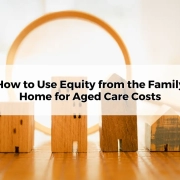How the Family Home Affects Your Age Pension Entitlement
Table of Contents
ToggleFor many Australians, the family home is more than just a place to live; it’s the cornerstone of their retirement strategy. However, as retirement approaches, understanding how this significant asset interacts with government benefits becomes increasingly crucial. Specifically, its impact on Age Pension entitlements can have far-reaching consequences. Navigating this complex terrain is essential to ensuring that retirees make informed decisions that safeguard both their financial future and their well-being.
The Role of the Family Home in Retirement Planning
The family home often represents the most substantial asset retirees possess. Its value, both emotional and financial, plays a pivotal role in how retirement unfolds. For those relying on the Age Pension as a significant income source, understanding how the home factors into this equation is vital. Whether it’s staying put, downsizing, or transitioning to aged care, each decision carries implications for pension entitlements that must be carefully considered.
Why Understanding Its Impact on Age Pension Entitlements is Crucial
Missteps in managing the family home’s impact on Age Pension entitlements can lead to reduced benefits, financial strain, and unforeseen tax consequences. As the government assesses assets and income to determine pension eligibility, the family home stands as a unique asset—often exempt, but with exceptions that can trip up the unwary. Clarity on this topic not only ensures retirees maximise their entitlements but also provides peace of mind as they enjoy their later years.
The Basics of Age Pension Entitlement
Eligibility Criteria for Age Pension in Australia
To qualify for the Age Pension in Australia, applicants must meet specific age, residency, and income/asset requirements. Generally, individuals must be 67 years or older, meet residency rules, and pass both income and asset tests. The asset test, in particular, is where the family home comes into play, determining how much pension, if any, an individual will receive. Understanding these criteria is the first step toward effective retirement planning.
The Assets Test: What It Is and How It Works
The assets test is designed to assess the total value of an individual’s assets, excluding the family home, to determine pension eligibility. Assets such as savings, investments, and properties (other than the primary residence) are tallied, and if their combined value exceeds a certain threshold, it can reduce or eliminate pension entitlements. The family home, however, enjoys a special status under this test, which can be both a blessing and a complication.
The Family Home and the Assets Test
Why the Family Home is Exempt from the Assets Test
One of the most significant aspects of the Age Pension system is the exemption of the family home from the assets test. This exemption allows retirees to live in their own home without its value affecting their pension eligibility. However, this rule applies primarily when the home is the principal place of residence. This exemption reflects the government’s recognition of the importance of housing stability in retirement.
Situations Where the Family Home May Affect Your Entitlement
While the family home is generally exempt, certain circumstances can alter this status. For example, if part of the property is used for business or investment purposes, its value may be partially included in the assets test. Additionally, if a retiree moves out—perhaps into aged care—the home’s exempt status may change, potentially impacting pension entitlements. Understanding these exceptions is crucial for strategic financial planning.
Downsizing and the Age Pension
How Selling Your Family Home Can Influence Your Pension
Downsizing, or selling the family home to purchase a smaller, less expensive property, is a common strategy among retirees. However, this decision can significantly impact Age Pension entitlements. The proceeds from the sale, if not reinvested into another home, are considered assessable assets and could reduce the pension. Thus, while downsizing may free up cash, it’s essential to consider the potential reduction in pension benefits.
The Downsizer Contribution Scheme: Benefits and Pitfalls
The Downsizer Contribution Scheme allows individuals aged 65 and over to contribute up to $300,000 of home sale proceeds into their superannuation fund. This scheme offers tax benefits and can be a useful tool for boosting retirement savings. However, these contributions may still affect pension entitlements under the assets test. Understanding both the benefits and the potential downsides is vital to making an informed decision.
Moving Into Aged Care and Its Impact
How Entering Aged Care Alters the Status of the Family Home
When a retiree moves into aged care, the status of the family home in relation to the Age Pension can change dramatically. If the home is left vacant or rented out, it may no longer be fully exempt from the assets test. The decision of what to do with the home—sell it, rent it, or leave it vacant—can have significant financial implications. Proper planning can mitigate these impacts and help maintain pension entitlements.
The Impact of Renting Out the Family Home on Your Pension
Renting out the family home while residing in aged care is a strategy some retirees use to generate income. However, this rental income, along with the home’s value, may be assessed under the assets test, potentially reducing or eliminating the pension. While renting can be a viable option, it requires careful consideration of the overall financial picture to avoid unexpected consequences.
Gifting the Family Home
The Rules Around Gifting and How They Affect Pension Entitlement
Gifting the family home, whether to children or other family members, is an option some retirees consider to reduce their assets and potentially increase their pension. However, the government’s gifting rules are strict, and gifts above a certain threshold can be counted as assessable assets for up to five years. This can lead to a reduction in pension entitlements, making it crucial to fully understand the rules before making any decisions.
Strategies to Minimise the Impact of Gifting on Your Pension
To minimise the impact of gifting on Age Pension entitlements, retirees can employ strategies such as spreading out gifts over several years to stay within allowable limits or planning gifts well in advance of pension eligibility. Consulting with a financial adviser is highly recommended to navigate these strategies and ensure that gifting aligns with long-term financial goals.
Reversionary Interest and the Family Home
What is Reversionary Interest and How It Relates to Age Pension
Reversionary interest refers to the arrangement where a property reverts to a beneficiary upon the death of the primary owner. In the context of the Age Pension, understanding how reversionary interest affects the status of the family home is crucial. This legal structure can influence how the home is treated under the assets test, potentially affecting pension entitlements both during the owner’s life and after their passing.
Pros and Cons of Utilising Reversionary Interest in Pension Planning
Utilising reversionary interest as part of pension planning offers both advantages and disadvantages. While it can help protect the family home from being fully assessed under the assets test, it may also complicate estate planning and affect the distribution of assets to heirs. Weighing these pros and cons, with the guidance of a financial adviser, is essential for making the best decision for both pension and legacy considerations.
Financial Hardship and Exemptions
Understanding the Financial Hardship Provisions for Pensioners
The Australian government recognises that some pensioners may face financial hardship, particularly when their assets are tied up in the family home. Financial hardship provisions allow for certain exemptions and considerations that can help maintain or restore pension entitlements in challenging circumstances. Understanding these provisions can provide a safety net for retirees facing unexpected financial difficulties.
When the Family Home Can Be Exempt from the Assets Test
In specific cases of financial hardship, the family home may be exempt from the assets test, even if it wouldn’t normally qualify. This exemption can apply in situations where selling the home would cause significant hardship, or where the home is the only substantial asset. Knowing when and how to apply for these exemptions is crucial for protecting pension entitlements in times of need.
The Impact of Investments in the Family Home
Home Renovations and Their Effect on Pension Entitlements
Investing in home renovations can enhance the value of the family home, but it’s important to understand how these improvements might affect pension entitlements. While the home itself is generally exempt from the assets test, any increase in value from significant renovations could potentially alter the assessment if the home’s status changes. Careful consideration of the timing and extent of renovations is key to ensuring they do not inadvertently affect pension eligibility.
Using the Home to Generate Income: Risks and Rewards
Generating income from the family home, whether through renting out a portion of the property or leveraging it through equity release schemes, offers potential financial benefits. However, these strategies come with risks, including the potential reduction of Age Pension entitlements. Balancing the rewards of additional income against the risks to pension benefits requires a nuanced approach and professional advice.
Planning Ahead: Strategies for Maximising Pension Entitlements
The Importance of Early Financial Planning
Early financial planning is essential for maximising Age Pension entitlements and ensuring long-term financial security. By considering the family home’s role in pension eligibility well in advance of retirement, retirees can implement strategies that protect their benefits and provide flexibility in managing their assets. The earlier planning begins, the more options are available, allowing for a tailored approach that meets individual needs and goals.
Consulting with an Aged Care Financial Adviser: Key Considerations
Given the complexity of how the family home affects Age Pension entitlements, consulting with an aged care financial adviser is highly recommended. A professional adviser can provide personalised advice, taking into account all aspects of the retiree’s financial situation. Key considerations include understanding the impact of the home on pension eligibility, exploring alternative strategies, and ensuring that all decisions align with long-term goals. Rob Laurie at Aged Care Financial Advisers in Toowoomba offers expert guidance tailored to each client’s unique circumstances. For personalised advice, call 1300 550 940.
Common Mistakes to Avoid
Pitfalls in Managing the Family Home and Pension Entitlement
Common mistakes in managing the family home in relation to Age Pension entitlements include underestimating the impact of selling, renting, or gifting the property. These actions, if not carefully planned, can lead to unintended reductions in pension benefits. Avoiding these pitfalls requires a thorough understanding of the rules and a proactive approach to financial planning.
How to Navigate Complex Scenarios with Professional Help
Navigating the complex scenarios that arise when managing the family home and pension entitlements often requires professional help. Engaging with a financial adviser can provide clarity and prevent costly mistakes. Whether dealing with reversionary interest, downsizing, or aged care transitions, professional guidance ensures that decisions are informed, strategic, and aligned with long-term financial security.
Conclusion
The family home plays a critical role in determining Age Pension entitlements, and strategic planning is essential to maximising benefits while safeguarding this important asset. By understanding the rules, exploring all options, and avoiding common pitfalls, retirees can ensure that their home supports their financial security in retirement.
As retirement approaches, taking the next steps in planning for your family home’s impact on Age Pension entitlements is crucial. Seeking advice from experienced professionals like Rob Laurie at Aged Care Financial Advisers can provide the guidance needed to navigate this complex area with confidence. For expert advice tailored to your unique situation, contact Aged Care Financial Advisers in Toowoomba at 1300 550 940.









